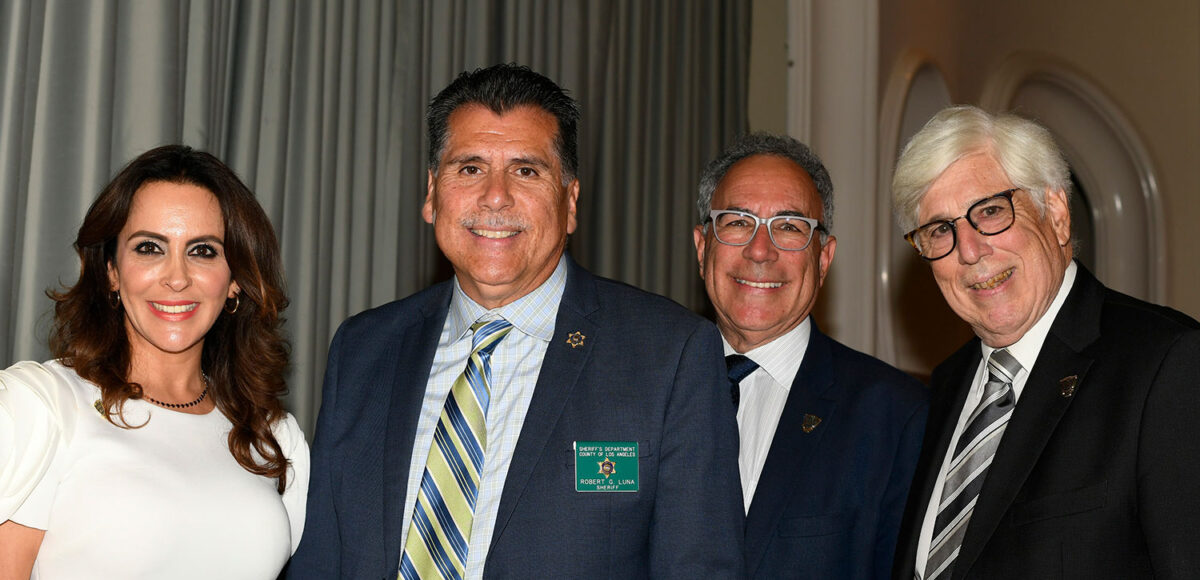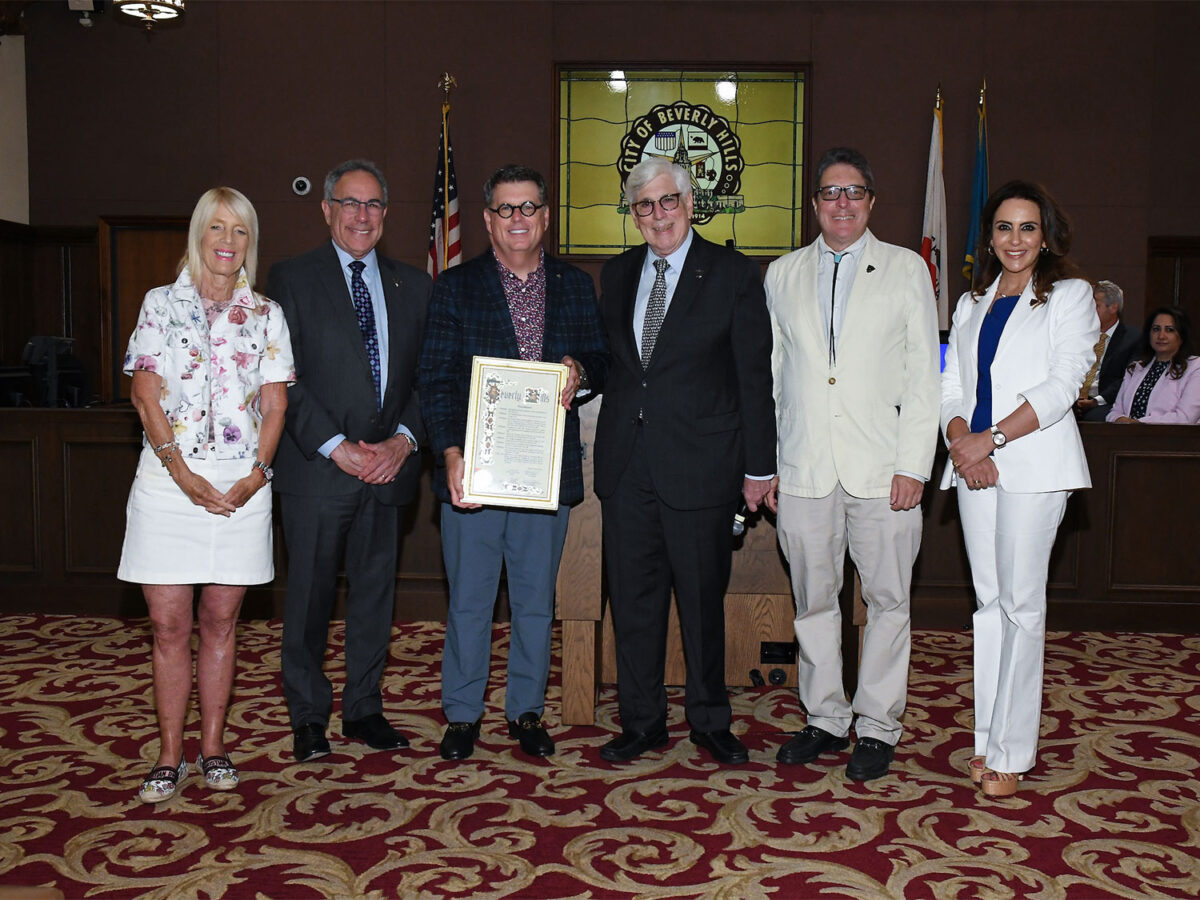Zero-bail policies, accountability for crimes— and for the actions of law enforcement—were topics touched upon briefly but forcefully at the Rotary Club of Beverly Hills luncheon this week.
The speaker, Los Angeles County Sheriff Robert Luna, commanded a larger-than-normal crowd at the Crystal Ballroom of the Beverly Hills Hotel on Aug. 28. Luna took office nine months ago after unseating the controversial incumbent, Alex Villanueva.
He inherited a scandal-plagued department with deep-seated issues to root out. But Luna’s nearly four decades in law enforcement (most recently as Long Beach Chief of Police), affable nature and gift for storytelling, combined with obvious political savvy, inspire confidence that he is up to the task.
His candor regarding the challenges facing his department struck an encouraging chord with the audience, as well.
In less than an hour, Luna managed to clear up some prevalent misconceptions and offer pragmatic, nuanced solutions to issues long deemed black-and-white.
There is indeed a new sheriff in town. And he began his remarks on a jovial note after arriving a minute or so past his appointed speaking time.
“I did not speed through Beverly Hills. I did not do anything wrong. Everywhere I looked there were cameras. And I smiled at each one of them,” he said, drawing laughter from the audience.
Luna then recited a few statistics regarding the country’s largest sheriff ’s department. “Los Angeles County is a little over 4,000 square miles, with over 10 million people documented that are here. I think there’s a lot more than 10 million people by the way.
The Los Angeles County Sheriff’s Department has about 17,000 employees, 10,000 of those are sworn employees. And our budget just grew to $3.9 billion.”
One of Luna’s first actions was to hire a CFO.
“Believe it or not, the sheriff’s department with that budget didn’t have a CFO running its operations. That’s probably why you saw a lot of the conflict between our board of supervisors and the office that I hold now,” he said.
He continued with additional daunting statistics, such as the fact that the department (in addition to cities and unincorporated areas) oversees security for nine community colleges, 37 courthouses and seven custodial facilities.
“Our average inmate population is about 14,000. And you may have heard this before, but we estimate that at least 40% of our population is mentally ill. So that makes us one of the largest mental illness facilities in the United States,” said Luna.
He then turned to another difficult issue. That is, the five consent decrees currently in effect over the department.
“For those of you who are not familiar with that terminology, a consent decree is basically an order from a judge, whether it’s a federal judge or state judge, that you’re mandated to do certain things. Unfortunately, as I inherited those coming in, it looks like we’re going to pick up two more because of past actions that I’ve inherited as well.”
The latter rather stark fact prompted Luna to hire a new Director of Constitutional Policing.
“Why did I do that? It is because there are two issues that, unfortunately, our department gets a lot of attention for. One of them I just named, which is the consent decrees. As a matter of fact, when I walked into my job, when I met with the federal monitors over Lancaster and Palmdale, they were telling us we were getting an ‘F’ grade. We were not even coming close to meeting the requirements under almost nine years of being under this,” observed Luna.
The Director of Constitutional Policing will help ensure compliance with settlement agreements, which are costing taxpayers millions each year. The goal, said Luna, is not only to eventually get out from under them, but to “realistically change our behavior to police in a more constitutional manner. That’s what’s gotten us in trouble in the past.“
Luna then turned to a topic on the minds of most of the public of late. That is, an uptick in brazen crime and the appropriate consequences therefore.
He began with a disclaimer of sorts.
“For those of you who haven’t met me in the past, I am a moderate person. I don’t believe that the answers are far to the right. And I don’t believe the answers are far to the left. We will always find solutions if we can find a compromise with a lot of things we do. But at the same time, always looking at ways of not sacrificing those values that are very important to me, to us,” said Luna.
He added that when he became a police officer, from day one he was “victim centered.”
“I care about serving people, and I care about what happens to people. So, from that perspective, when you have a victim of a crime, it is our job to make sure that not only are we taking care of them but also making sure that there’s justice for the crimes that have been committed. And that’s always very, very important. But as we move forward, recognizing it’s 2023, there are some challenges in that area,” he said.
He recognized that the Inspector General and Civilian Oversight Commission both play an integral role in ensuring public trust in such a huge and diverse county.
Beverly Hills, of course, is within that county. In addition to the obvious camaraderie between Luna and BHPD Chief Mark Stainbrook—who was in attendance, as was Fire Chief Greg Barton—Luna expressed admiration for the city’s technological prowess.
“It has put you on the map, those cameras, the drones, and the integration of all that technology with ALPR (automated license plate reader) systems. If somebody does commit a crime here in Beverly Hills, they’re most likely going to be held or at least are going to be arrested. So, I really tip my hat to you, to Mark and anybody who was involved in the decision-making to do that. As I look out and forward to what we’re going to do with the Los Angeles County Sheriff’s Department, a lot of it’s going to look like what you’re doing now,” said Luna.
On the topic of looking forward, Luna spoke of the global events set for Los Angeles in the years to come.
“I just spent a couple of hours last week with a lot of my peers discussing a small event coming in 2028 called the Olympics. And from what I understand, it is going to be the largest public event ever in the history of the world. It’s a very large footprint, and I’m excited to be part of it. I’m excited that all of our law enforcement and fire partners, really everybody in this room is going to be a big part of that. And then two years before then you have the World Cup coming, which will be a very good practice run for all of us.”
He added that he will be traveling next summer to Paris, to see first-hand how that city is incorporating technology to keep the 2024 games safe.
One of the last topics Luna discussed in his prepared remarks was zero bail. The policy, which eliminates bail for certain categories of crimes, is a touchstone issue for both the right and the left. Luna brought up complexities often overlooked by both sides.
He first told of a recent town hall at a mall in the Ladera Heights area, along with LAPD Chief Michael Moore.
“The business owners were telling us that they’re getting hit almost two times a day, with people running in and grabbing items and leaving. That is 100% unacceptable. It should not be the norm. It can’t be the norm. People are asking, ‘Is this person going to go to jail, or are they going to get cited?’ Those are very, very important questions that we should be asking,” said Luna.
He noted that Beverly Hills is no stranger to what has become known as a “smash and grab, grab and go or whatever terminology you want to use,” said Luna.
He continued, “Now before anyone throws their cookies at me, I mentioned this earlier. I’m a moderate. I’m a person that doesn’t believe that everyone needs to be in jail. But I do believe the right people need to be in jail. And I believe that when people commit crimes, they need to be held accountable. And right now, there’s so many questions specifically here in California, specifically here in LA County, about policies that exist.”
He went on to describe two specific challenges regarding zero-cash bail. One is the preliminary injunction issued in the ongoing class action of Urquidi v. Los Angeles et. al against the LAPD and the LA Sheriff’s Department.
“The Beverly Hills Police Department didn’t get included in that. Well, why is this important? Because if somebody gets arrested here in Beverly Hills, and they meet certain categories of a crime, where do you think they go? They come to me at the Los Angeles County Jail. And because I have that injunction placed on our department, we can only take certain categories of people.”
He added, “So if you commit what the law considers to be a serious crime, or a violent crime, you’re not affected by this, but everything else is. So, somebody breaks into your house. That’s not considered a serious crime or a violent crime. Somebody steals a package off your porch, that’s not considered under these categories. One of the most striking things is if you get caught selling fentanyl or methamphetamine, it’s not considered a serious or violent crime,” said Luna.
He noted that both he and Chief Moore have testified in an attempt to have the judge in the Urquidi case reconsider. But, thus far, the injunction still stands.
Complicating the matter even more are the new pre-arraignment release protocols that take effect Oct. 1 throughout the county of Los Angeles. Those new rules (which the Courier will explore in a future issue) determine release status based on an arrestee’s risk to public or victim safety and their likelihood of returning to court, rather than relying on money bail.
He concluded by noting that despite frequent frustration, crime is actually down slightly.
“At the end of the day, you all have the power to hold people accountable. And remember, when we’re talking about crime, when we’re talking about the criminal justice system, law enforcement, it’s only one part of it. You have the district attorney’s office, you have the city attorney’s office, you have the public defender’s office, and then you have the judges that are involved. They’re great people. But the zero-bail thing, there’s some misinformation out there that this comes from the DA’s office. The zero-bail issue is coming from the judges. That’s a whole different branch of this judicial system that we have law enforcement work with.”
During a brief question and answer session that followed, Luna was asked about claims that ALPR technology is overly invasive of privacy rights.
“I’m going to tell you something, if you remember several months ago, we had that very tragic mass shooting in Monterey Park. You know how we caught that suspect? ALPR. We picked up his license plate in another adjoining city. Those tools are absolutely necessary, and they keep you and your families safe. I need to throw that out there because I know they could be controversial. On the law enforcement side, we need to make sure that we have good policies, that we have good training to make sure we’re adequately using it…These technologies are just absolutely critical to law enforcement being successful in keeping our communities safe.”
When asked again to explain the logic of the zero-bail system, he gave this final take:
“The whole argument for zero bail is that if you don’t have any money; it’s unconstitutional to hold you. This is not my opinion; this is theirs. It’s unconstitutional for them to hold you for the mere fact you don’t have money. So, if you take two individuals and they commit the same crime, one has money one doesn’t. The one with money gets out, the other stays…If somebody commits a crime for the first time, should they be given a second chance? I’m a believer of second chances, but I think each case has to be evaluated on its own,” said Luna.
He concluded with a story that summed up many of the themes of the past hour.
“My wife and I went out to dinner last Friday. We ended up at a Marshalls store in Long Beach. And as soon as we walked in, there were two women walking out with two full bags of stuff. And my wife said, ‘Hey, they’re stealing.’ And I turned around and I started to follow them. And I mean, I tell people not to do this…[laughter].
“But, as any cop in the room will tell you, there’s something inside of us that says, ‘Don’t allow this to happen.’ So, I followed up. They took off running. I did not run after them. I did follow them. And eventually, one of them dropped the bag. The other one took off, and she was fast.”
After taking the recovered bag back to Marshalls, Luna was dismayed to learn that store employees are instructed to neither confront thieves nor call police when thefts take place.
“If you are a store owner sitting here listening to me, please don’t do that. It encourages people to do exactly what I just described. People are filling up bags and they’re walking off with them, and it’s 100% wrong. And we need to stop it as a community to let people know what’s tolerated and what’s not. Those two young ladies who took off running were too fast for me. Maybe 25 years ago, I may have been able to catch up. I was hoping they would get in a car so I could get the plate and report it, but that didn’t happen. But at least I recovered half the stuff.”







